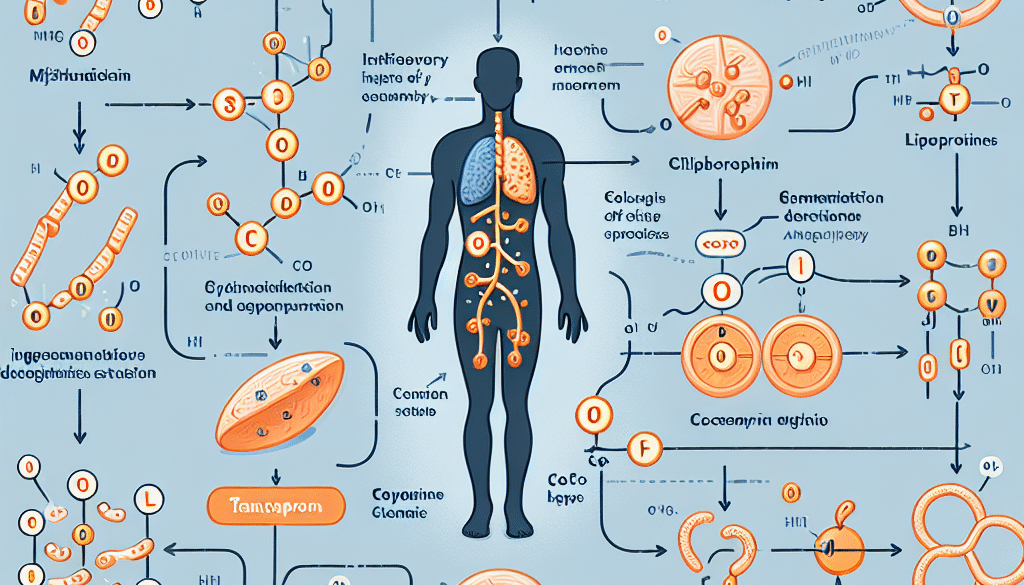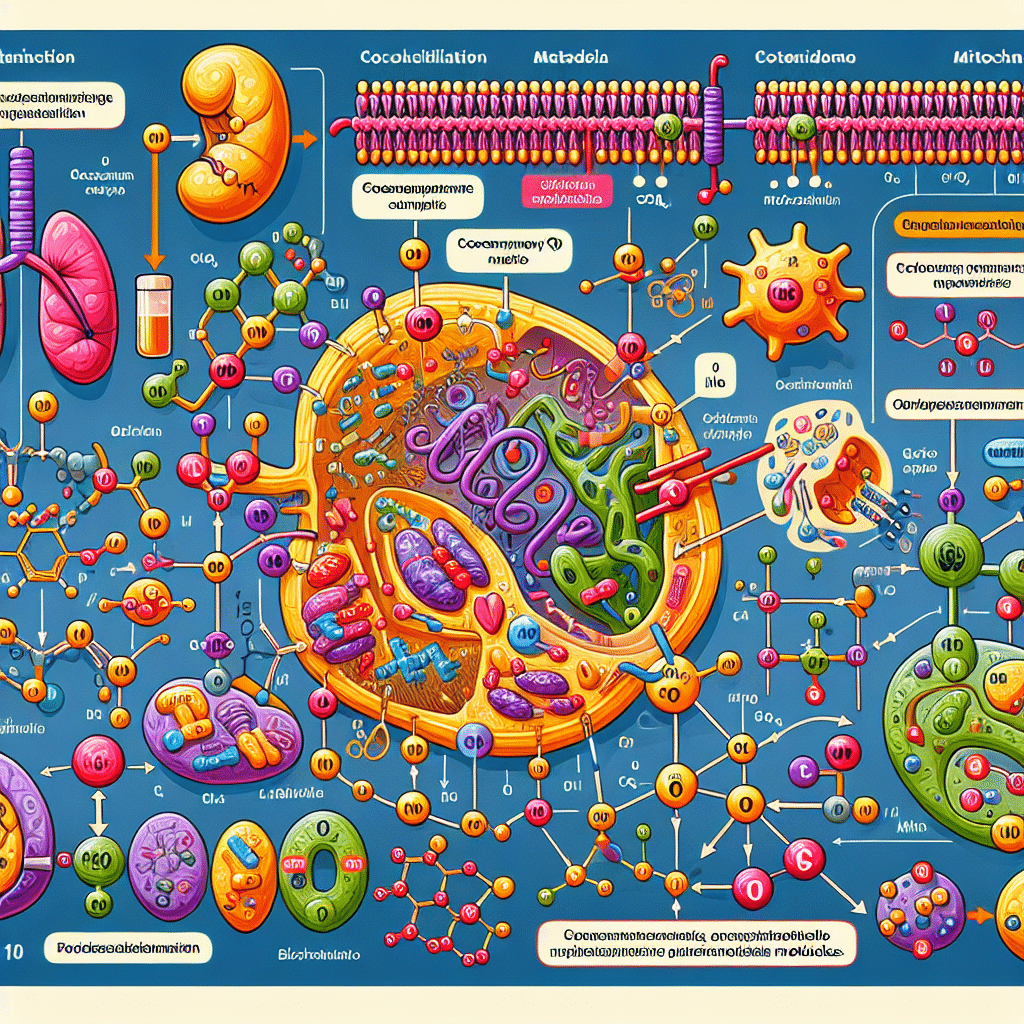CoQ10 Metabolism: How It Works
-
Table of Contents
- CoQ10 Metabolism: Essential for Cellular Energy and Health
- Understanding CoQ10: A Vital Cellular Component
- The Biochemical Role of CoQ10
- CoQ10 Synthesis and Dietary Sources
- CoQ10 Deficiency and Health Implications
- CoQ10 Supplementation: Benefits and Considerations
- CoQ10 and Exercise Performance
- CoQ10 and Aging
- CoQ10 and Skin Health
- Conclusion: The Importance of CoQ10 Metabolism
- Enhance Your Health with ETChem’s Protein Products
CoQ10 Metabolism: Essential for Cellular Energy and Health
Coenzyme Q10, commonly known as CoQ10, is a vital component in the metabolic processes that provide energy to cells. It is a naturally occurring substance that plays a critical role in the production of adenosine triphosphate (ATP), which is the primary energy currency of the cell. Understanding CoQ10 metabolism is crucial for appreciating its importance in maintaining health and preventing disease.
Understanding CoQ10: A Vital Cellular Component
CoQ10 is a fat-soluble compound found in every cell of the body, with particularly high concentrations in organs with significant energy demands, such as the heart, liver, kidneys, and muscles. It exists in two primary forms: ubiquinone (the oxidized form) and ubiquinol (the reduced form), which have distinct roles in the body’s metabolic processes.
The Biochemical Role of CoQ10
CoQ10 is an essential component of the electron transport chain, a series of protein complexes located in the inner mitochondrial membrane. This chain is responsible for the final steps of aerobic respiration, where electrons are transferred from donors to acceptors, ultimately leading to the synthesis of ATP. CoQ10 acts as an electron carrier, shuttling electrons between complexes within the chain.
CoQ10 Synthesis and Dietary Sources
The human body can synthesize CoQ10, with the process involving multiple steps and requiring several vitamins and trace elements. However, certain conditions, such as genetic mutations, nutrient deficiencies, or increased tissue demands, can impair CoQ10 synthesis, leading to deficiencies. Dietary sources of CoQ10 include meat, fish, nuts, and some oils, which can help maintain adequate levels.
CoQ10 Deficiency and Health Implications
A deficiency in CoQ10 can have significant health implications, as it impairs the cell’s ability to produce energy efficiently. Symptoms of CoQ10 deficiency may include muscle weakness, fatigue, and organ dysfunction. Chronic diseases such as heart failure, Parkinson’s disease, and certain types of cancer have been associated with low CoQ10 levels.
CoQ10 Supplementation: Benefits and Considerations
CoQ10 supplementation is often recommended for individuals with certain health conditions, those taking statin medications, or the elderly, who may have reduced CoQ10 production. Supplementation has been shown to improve symptoms in conditions like heart failure and migraines. However, it is essential to consider the form of CoQ10, dosage, and potential interactions with other medications.
CoQ10 and Exercise Performance
Research suggests that CoQ10 supplementation may enhance exercise performance by improving mitochondrial function and reducing oxidative stress. Athletes and physically active individuals may benefit from CoQ10 to support energy production and recovery.
CoQ10 and Aging
As we age, CoQ10 levels naturally decline, which may contribute to the aging process and age-related diseases. Supplementation has been proposed as a means to potentially slow aging and improve the quality of life in older adults.
CoQ10 and Skin Health
CoQ10 also plays a role in skin health, protecting against photoaging and improving the appearance of wrinkles. Its antioxidant properties help to neutralize free radicals that can damage skin cells.
Conclusion: The Importance of CoQ10 Metabolism
In conclusion, CoQ10 metabolism is a cornerstone of cellular energy production and overall health. Its role in the electron transport chain and as an antioxidant makes it essential for the proper functioning of the body’s organs and systems. Understanding the importance of CoQ10 can help individuals make informed decisions about their health, particularly regarding supplementation and dietary choices.
Enhance Your Health with ETChem’s Protein Products
If you’re looking to support your CoQ10 levels and overall health, consider incorporating high-quality protein products into your diet. ETChem offers a range of premium collagen products that can complement your health regimen. Their protein products are designed to cater to various needs, from sports nutrition to general wellness.
About ETChem:
ETChem, a reputable Chinese Collagen factory manufacturer and supplier, is renowned for producing, stocking, exporting, and delivering the highest quality collagens. They include marine collagen, fish collagen, bovine collagen, chicken collagen, type I collagen, type II collagen, and type III collagen, etc. Their offerings, characterized by a neutral taste, instant solubility attributes, cater to a diverse range of industries. They serve nutraceutical, pharmaceutical, cosmeceutical, veterinary, as well as food and beverage finished product distributors, traders, and manufacturers across Europe, USA, Canada, Australia, Thailand, Japan, Korea, Brazil, and Chile, among others.
ETChem specialization includes exporting and delivering tailor-made collagen powder and finished collagen nutritional supplements. Their extensive product range covers sectors like Food and Beverage, Sports Nutrition, Weight Management, Dietary Supplements, Health and Wellness Products, ensuring comprehensive solutions to meet all your protein needs.
As a trusted company by leading global food and beverage brands and Fortune 500 companies, ETChem reinforces China’s reputation in the global arena. For more information or to sample their products, please contact them and email karen(at)et-chem.com today.





